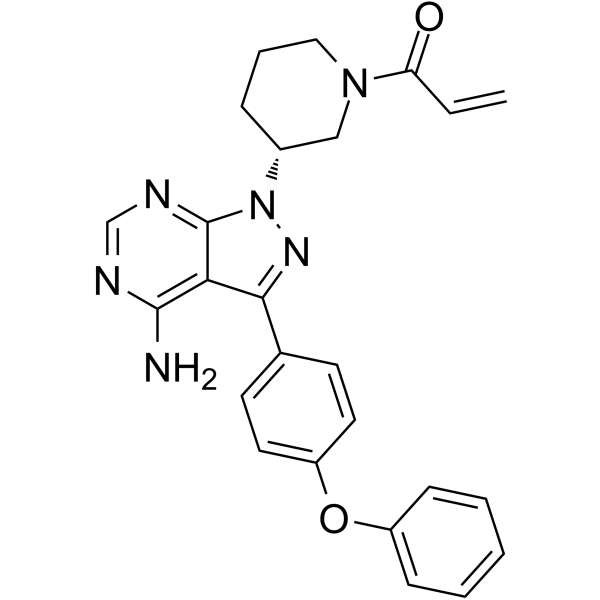Home
Products
Ibrutinib (PCI-32765)



| Product Name | Ibrutinib (PCI-32765) |
| Price: | Inquiry |
| Catalog No.: | CN00504 |
| CAS No.: | 936563-96-1 |
| Molecular Formula: | C25H24N6O2 |
| Molecular Weight: | 440.5 g/mol |
| Purity: | >=98% |
| Type of Compound: | Alkaloids |
| Physical Desc.: | Powder |
| Source: | |
| Solvent: | Chloroform, Dichloromethane, Ethyl Acetate, DMSO, Acetone, etc. |
| SMILES: | C=CC(=O)N1CCC[C@H](C1)n1nc(c2c1ncnc2N)c1ccc(cc1)Oc1ccccc1 |
| Contact us | |
|---|---|
| First Name: | |
| Last Name: | |
| E-mail: | |
| Question: | |
| Description | Ibrutinib (PCI-32765) is a selective, irreversible Btk inhibitor with an IC50 of 0.5 nM. |
| Target | IC50: 0.5 nM (Btk) |
| In Vitro | Ibrutinib (PCI-32765) selectively inhibits B-cell signaling and activation. It inhibits autophosphorylation of Btk (IC50=11 nM), phosphorylation of Btk's physiological substrate PLCγ (IC50=29 nM), and phosphorylation of a further downstream kinase, ERK (IC50=13 nM)[1]. Ibrutinib (PCI-32765) inhibits BCR-activated primary B cell proliferation (IC50=8 nM). Following FcγR stimulation, Ibrutinib (PCI-32765) inhibits TNFα, IL-1β and IL-6 production in primary monocytes (IC50=2.6, 0.5, 3.9 nM, respectively)[3]. |
| In Vivo | Ibrutinib (PCI-32765) (3.125-50 mg/kg, p.o.) reduces the level of circulating autoantibodies and completely suppresses disease in mice with collagen-induced arthritis. Ibrutinib (PCI-32765) inhibits autoantibody production and the development of kidney disease in the MRL-Fas(lpr) lupus model. Ibrutinib (PCI-32765) (3.125-50 mg/kg, p.o.) reduces renal disease and autoantibody production in MRL-Fas(lpr) mice[1]. Ibrutinib (PCI-32765) (0.1 μM) inhibits activation-induced proliferation of CLL cells, induces selective cytotoxicity in B cells compared with T cells, but alters activation induced T-cell cytokine production[2]. Ibrutinib (PCI-32765) dose-dependently and potently reverses arthritic inflammation in a therapeutic CIA model with an ED50 of 2.6 mg/kg/day. Ibrutinib (PCI-32765) also prevents clinical arthritis in CAIA models[3]. |
| Cell Assay | Primary human B cells are isolated from peripheral blood mononuclear cell of healthy human volunteers by Ficoll-Hypaque gradient separation followed by negative selection using human Miltenyl human B cell Isolation Kit II. In 0.2 mL RPMI plus 10% FBS, 100,000 B cells are treated with Ibrutinib (PCI-32765) (0.3 nM-10 μM) in triplicate wells or vehicle control in 0.1% DMSO final concentration for 30 minutes at 37°C, 5% CO2, then cells are stimulated with 10 μg/mL anti-IgM F(ab')2, 5 μg/mL anti-CD3/CD28 as a negative control or 0.5 μg/mL PMA (Phorbal 12-myristate 13-acetate) as a positive control. B cells are stimulated for 72 hours at 37°C, 5% CO2. Proliferation is measured with Cell Titer Glo reagent and measured on a luminometer. |
| Animal Admin | Male DBA1/1OlaHsd mice are injected on days 0 and 21 with Freunds' Complete Adjuvant containing bovine type II collagen. On days 21 to 35, mice are randomized into treatment groups when the average clinical score of each animal is 1.5 (in a scale of 5). Ibrutinib (PCI-32765) treatment (1.56-12.5 mg/kg, p.o.) is initiated following enrollment and continues for 18 days. Clinical scores are given to each mouse daily for each paw. Clinical score assessment is made using the following criteria: 0=normal; 1=one hind paw or fore paw joint affected or minimal diffuse erythema and swelling; 2=two hind or fore paw joints affected or mild diffuse erythema and swelling; 3=three hind or fore paw joints affected or moderate diffuse erythema and swelling; 4=marked diffuse erythema and swelling or four digit joints affected; 5=severe diffuse erythema and severe swelling of entire paw, unable to flex digits. |
| Density | 1.3±0.1 g/cm3 |
| Boiling Point | 715.0±60.0 °C at 760 mmHg |
| Flash Point | 386.2±32.9 °C |
| Exact Mass | 440.196075 |
| PSA | 99.16000 |
| LogP | 2.92 |
| Vapour Pressure | 0.0±2.3 mmHg at 25°C |
| Storage condition | -20°C |